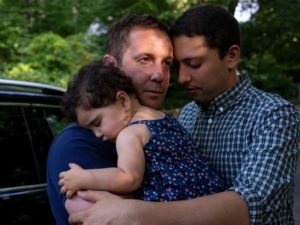James Derek Mize is an American citizen, born and raised in the United States. His husband, who was born in Britain to an American mother, is a United States citizen, too. Now the State Department is dictating the citizenship of their child.
But the couple’s infant daughter isn’t, according to the State Department.
She was born abroad to a surrogate, using a donor egg and sperm from her British-born father. Those distinct circumstances mean that, under a decades-old policy, she did not qualify for citizenship at birth, even though both her parents are American.
“It’s shocking,” said Mr. Mize, 38, a former lawyer who lives in Atlanta with his husband, Jonathan Gregg, a management consultant. The couple received a letter denying their daughter’s citizenship last month.
“We’re both Americans; we’re married,” Mr. Mize said. “We just found it really hard to believe that we could have a child that wouldn’t be able to be in our country.”
Their case illustrates the latest complication facing some families who use assisted reproductive technology, like surrogacy and in vitro fertilization, to have children. For years the techniques have set off provocative legal and ethical debates about what defines parenthood. Immigration and citizenship are the latest frontier in those debates.
At issue is a State Department policy, based on immigration law, that requires a child born abroad to have a biological connection to an American parent in order to receive citizenship at birth. That is generally not a problem when couples have babies the traditional way, but can prove tricky when only one spouse is the genetic parent.
The policy has come under intense scrutiny in recent months amid lawsuits arguing that the State Department discriminates against same-sex couples and their children by failing to recognize their marriages. Under the policy, the department classifies certain children born through assisted reproductive technology as “out of wedlock,” which triggers a higher bar for citizenship, even if the parents are legally married.
In one instance, a married Israeli-American gay couple had twin sons in Canada using sperm from each of the fathers. The biological son of the American received citizenship, but his brother, the biological son of the Israeli, did not. In February, a federal judge sided with the couple, calling the State Department’s interpretation of the immigration law “strained.” The department is appealing.
The government is also fighting a similar suit from a lesbian couple in London, who did not use a surrogate. One is American and one is Italian. They took turns conceiving and carrying their two children. Only the child born to the American mother was granted citizenship. Last week, a federal judge allowed the case to proceed, calling the family’s predicament “terrible” and “outrageous.”
The post Both Parents Are American. The U.S. State Department Says Their Baby Isn’t. appeared first on Time For Families.
Source: Time for Families
